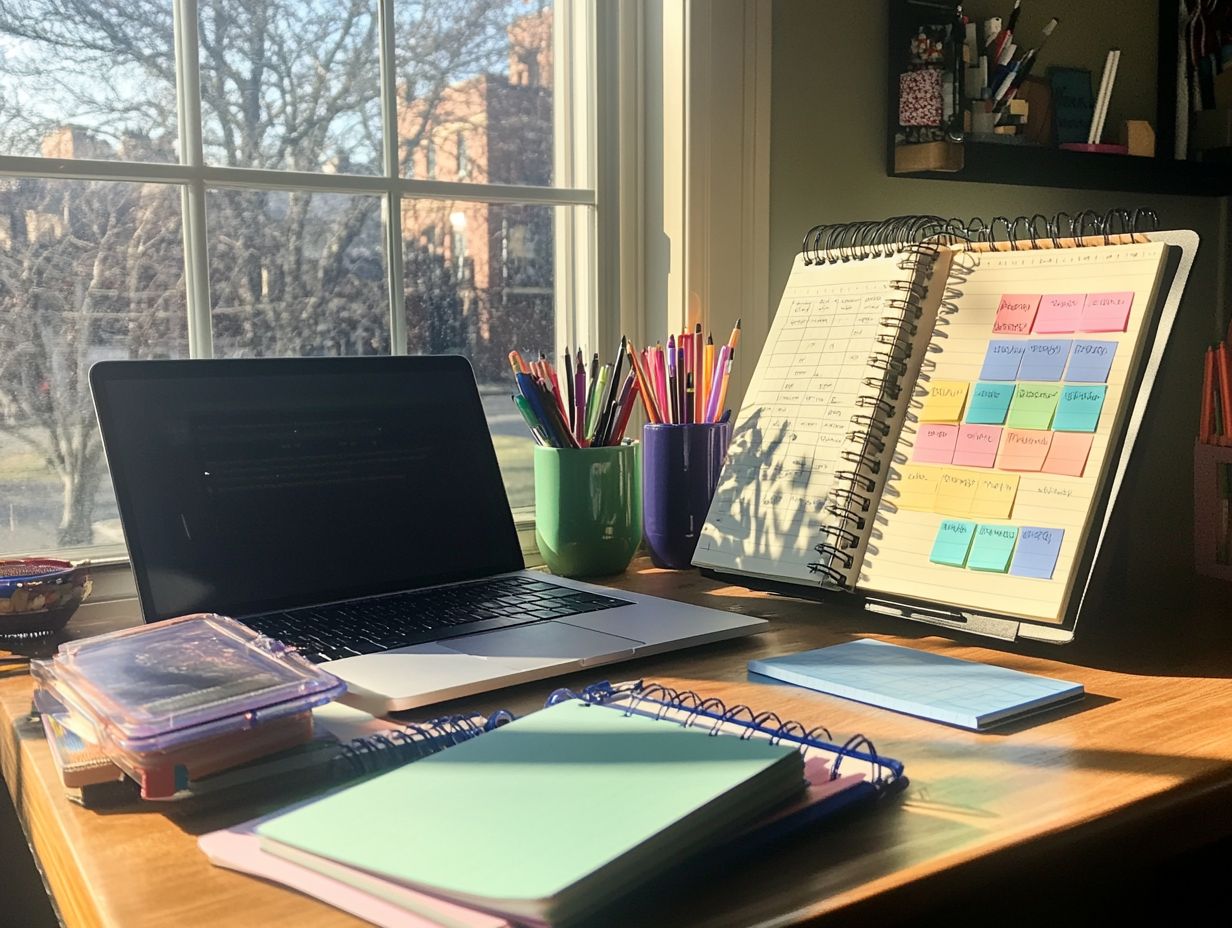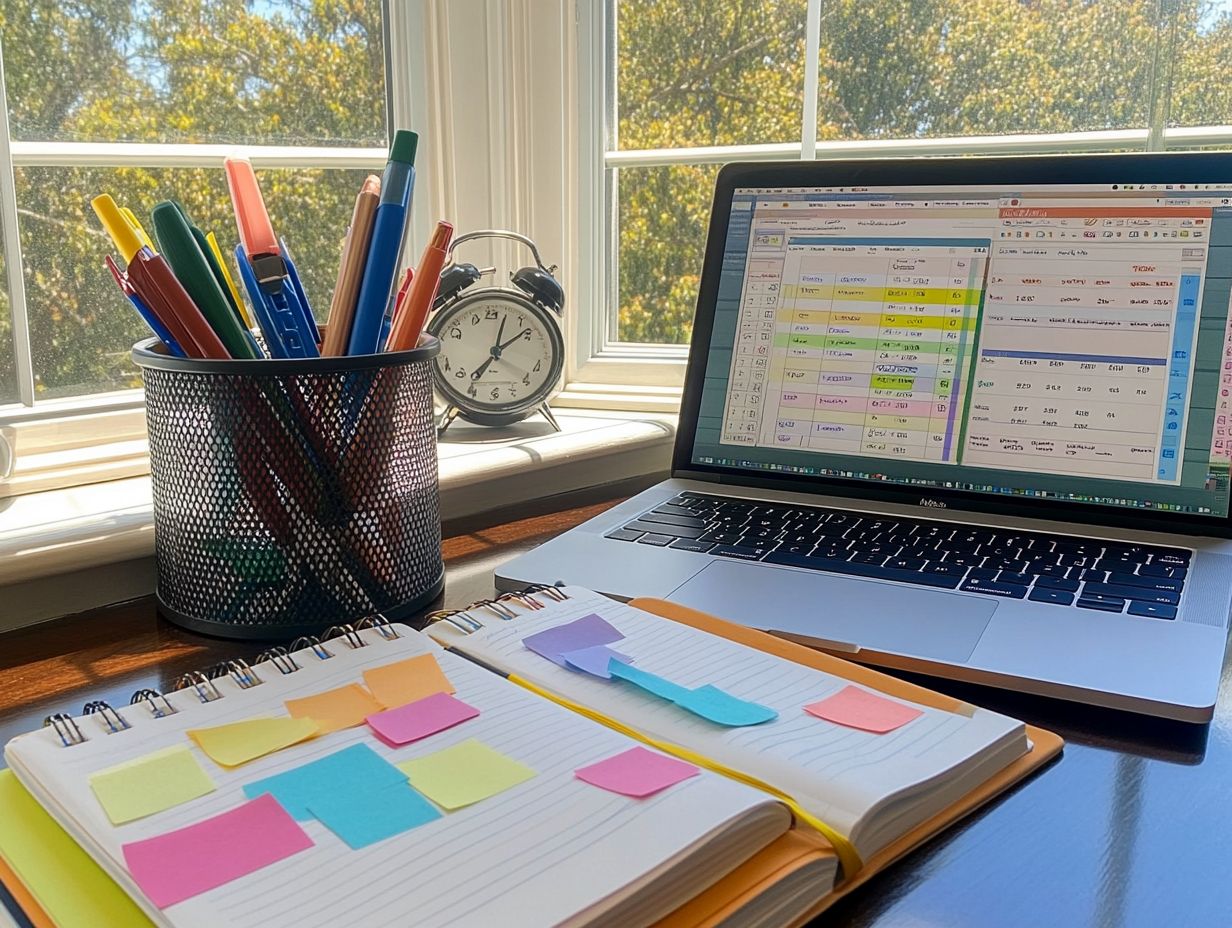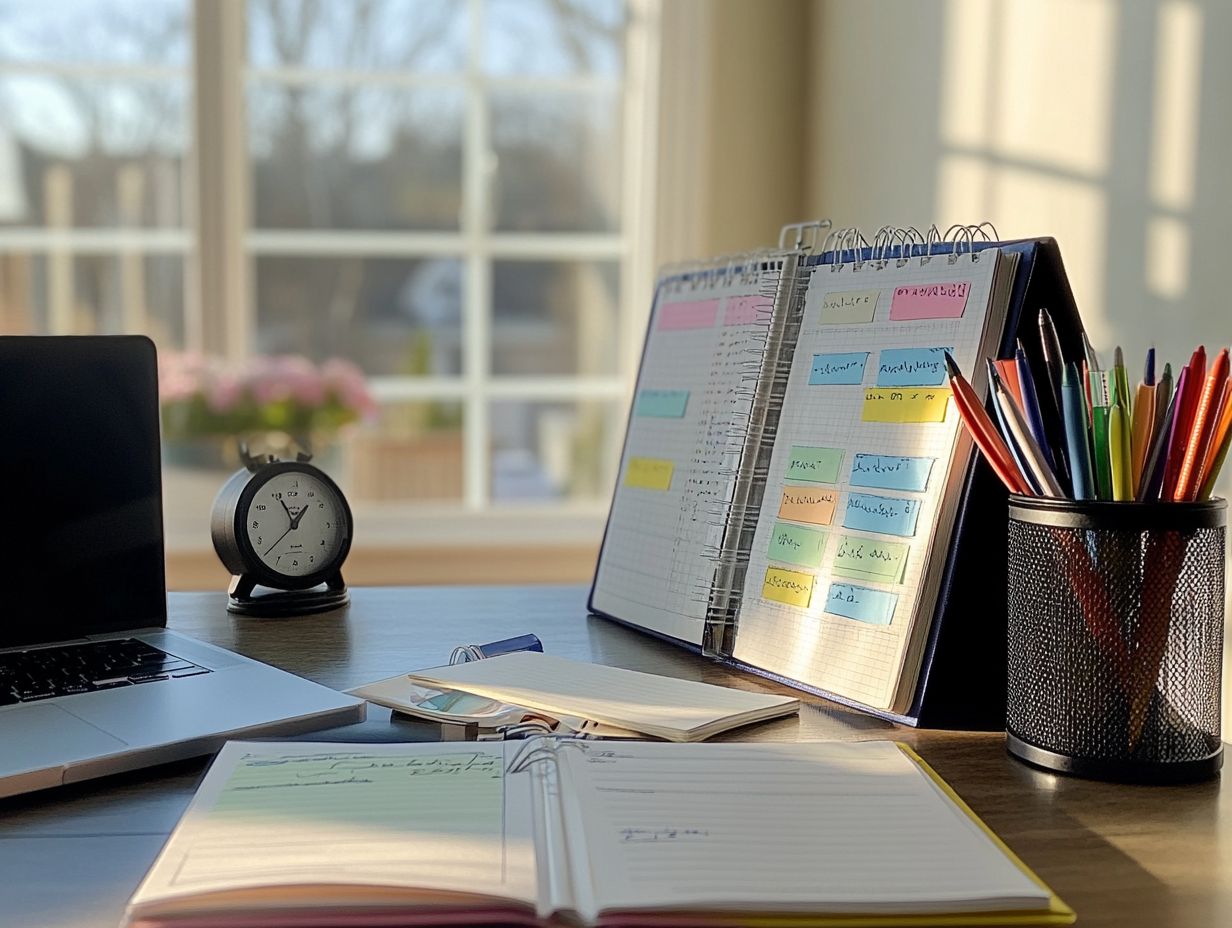how to stay organized during study sessions
Staying organized during your study sessions can significantly enhance your academic performance and reduce stress levels.
When your materials and time are meticulously structured, focusing becomes easier, information retention improves, and achieving your goals becomes a more attainable endeavor.
This article delves into the many benefits of being organized, guides you in crafting a personalized study plan, and presents tools and strategies to keep you on course.
You will also find practical tips to help you maintain this organization for truly successful study sessions.
Contents
Key Takeaways:

Stay organized during study sessions to maximize productivity and efficiency. To achieve this, learn how to stay organized during test prep by creating a study plan, setting goals, prioritizing tasks, and breaking them into manageable parts. Utilize tools and strategies such as planners, calendars, and organized study materials to stay on track.
Why Organization is Important for Study Sessions
Staying organized is essential for students navigating study sessions, particularly in online classes. Balancing assignments, deadlines, and materials can often feel overwhelming, but knowing how to stay organized during test preparation is your secret weapon.
It boosts your productivity and helps you manage your time effectively, helping you stay ahead academically and reduce stress. Implementing strategies to maintain order in your study materials, schedules, and tasks is vital for creating a good learning environment.
With this structure in place, you set yourself up for academic success and a more enjoyable learning experience.
Benefits of Staying Organized
One of the key advantages of staying organized is your ability to manage important due dates with finesse. This skill allows you to review past material and plan upcoming tasks without falling prey to overwhelming distractions.
This approach sharpens your focus on crucial assignments and boosts your productivity. For instance, when you diligently jot down your deadlines in a planner, you create a visual hierarchy of tasks, which enhances your time management and facilitates efficient study sessions.
By breaking larger projects into manageable chunks, you can tackle them systematically just like when a junior divides their semester project into weekly goals. These techniques not only help you meet deadlines but also cultivate a rewarding sense of accomplishment, showcasing how effective organization can pave the way for success in your academic journey.
Creating a Study Plan

Creating your study plan is crucial for your success! It enables you to set up a dedicated workspace tailored to your goals and priorities.
With a well-structured plan, you can manage assignments and deadlines with clarity and ease, ensuring that you stay on top of your academic responsibilities.
Setting Goals and Priorities
Setting clear goals and priorities helps you create a to-do list that aligns perfectly with your deadlines and overarching study objectives.
By establishing specific, measurable targets, you can break down your study material into bite-sized chunks, making it much easier to track your progress and maintain motivation. This clarity sharpens your focus and drives your success as you reach each goal.
To prioritize tasks effectively, take a moment to assess the urgency and importance of each assignment. Utilizing tools like digital calendars or productivity apps can help you stay organized and on top of things.
Setting deadlines for individual tasks creates a structured timeline, encouraging you to stick to a study schedule that maximizes efficiency while minimizing stress.
Breaking Down Tasks
Breaking down tasks into manageable segments is a smart strategy for handling your assignments. It enables you to plan your upcoming study sessions effectively while allowing for regular breaks that help maintain your focus.
By employing techniques like creating detailed checklists and using apps that help you keep track of tasks, you can streamline your workflow even further. This approach simplifies complex tasks and brings a gratifying sense of accomplishment with each item you complete.
As you start using these tools regularly, you may notice a significant drop in stress levels, leading to improved concentration and a more enriching academic experience.
These methods empower you to prioritize your workload, ensuring essential deadlines are met while encouraging a healthy balance between study and relaxation.
Tools and Strategies for Staying Organized

Utilizing the right tools and strategies is vital for maintaining organization. Whether it involves managing your inbox effectively, using bookmarks for valuable web resources, or setting reminders through Google Calendar, these practices enhance your productivity.
Using a Planner or Calendar
Using a planner or digital calendar, like Google Calendar, is an excellent way to streamline your organization, set reminders, and keep track of important deadlines.
These tools come in various forms, from traditional paper planners to advanced apps that sync across your devices. A weekly planner allows you to visualize your tasks and appointments at a glance, making it easier to allocate time for studying, extracurricular activities, and social events.
Digital calendars allow shared access, making group projects or team assignments flow more smoothly. By incorporating color-coded labels for different activities, you can quickly identify your commitments, empowering you to prioritize tasks effectively.
Whether blocking out time for homework or scheduling regular breaks, these planners and calendars are essential for enhancing productivity and reducing stress.
Organizing Study Materials
Organizing your study materials, both physical and digital, is crucial for creating an efficient study space that promotes focus and enhances learning by providing easy access to your notes and resources.
A well-structured environment boosts your productivity while minimizing stress as you prepare for exams or tackle projects.
Using various methods like creating digital folders for electronic documents and labeling notebooks for handwritten notes can streamline your information flow.
Invest in storage solutions like binders or filing cabinets. These help you manage textbooks and worksheets efficiently.
Tips for Maintaining Organization

Maintaining organization demands consistent effort from you as a student. To elevate your efficiency, consider implementing effective strategies such as:
- Keeping your study space tidy
- Managing your time judiciously
- Minimizing distractions
These practices will undoubtedly enhance your productivity and create a more conducive learning environment. Start implementing these tips today and see the difference!
Keeping a Clean and Tidy Study Space
A clean and tidy study space can dramatically enhance your organization and minimize distractions, allowing you to focus more intently on your work and significantly improve your overall productivity.
This not only elevates your efficiency but also nurtures a positive mindset that fosters both learning and creativity.
By adopting simple habits, you can create a profound impact. Dedicating just ten minutes at the end of each study session to declutter ensures that your materials are always in their rightful places.
Incorporating storage solutions like bins or organizers can further streamline your environment, keeping essential tools easily accessible.
Maintaining a minimalistic approach and regularly assessing whether items are truly needed helps cultivate a serene atmosphere that encourages concentration and reduces stress.
Managing Time Effectively
Effective time management is essential for students to work efficiently and meet deadlines without feeling overwhelmed. Taking regular breaks can enhance productivity.
Using techniques like the Pomodoro Technique can significantly improve focus and efficiency during study sessions. Work in intervals of 25 minutes followed by a 5-minute break to maintain high concentration levels while allowing your mind to rest and recharge.
Implement time blocking by designating specific slots for different tasks. This structured routine minimizes distractions. Setting aside a dedicated hour each day for assignments can create a predictable schedule that fosters discipline and organization.
Staying Motivated and Focused
Staying motivated and focused during study sessions can be challenging with distractions lurking around every corner. In today s fast-paced world, it s essential to adopt effective strategies to enhance concentration.
Establish small, achievable rewards for completing tasks to elevate morale and encourage progress. Use focus-enhancing tools like the Pomodoro Technique or meditation apps to maintain attention for longer periods. Breaking study sessions into manageable intervals helps prevent burnout while maximizing efficiency.
Creating an organized, clutter-free study environment keeps distractions at bay, ensuring your focus remains sharp and your mind clear.
Frequently Asked Questions
How can I stay organized during study sessions?
To stay organized, create a schedule or study plan to prioritize tasks and allocate time for each subject. Additionally, consider organizing your study materials for success by keeping your study space clutter-free and using planners, folders, and color-coded notes.
How can I create a study schedule that works for me?
Identify your goals and prioritize tasks based on importance and due dates. Allocate specific time slots for each subject and stick to the schedule. Include breaks and rewards to avoid burnout.
How can I keep my study space organized?
Regularly declutter your study space, keeping only necessary materials on your desk. Use shelves, drawers, and desk organizers to store books and supplies. Designate a spot for each item for easy access.
What are some effective tools for staying organized during study sessions?
Effective tools include planners, color-coded notes, folders, digital flashcards, and online study tools. These help track tasks and organize notes and materials.
How can I avoid distractions during study sessions?
Find a quiet study space to avoid distractions. Turn off your phone or put it on silent, and avoid social media or non-study-related websites. Set specific goals and rewards to stay focused.
What should I do if I fall behind on my study schedule?
If you fall behind, reassess your goals and tasks, making adjustments to your schedule. Prioritize the most important tasks and try to catch up. Seek help from a tutor or classmate if needed, and learn from the experience to plan better in the future.
Start implementing these strategies today for effective studying!





